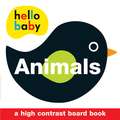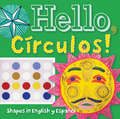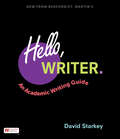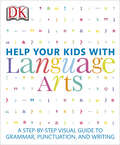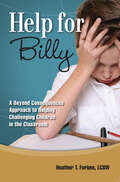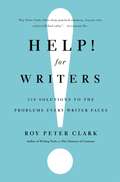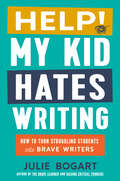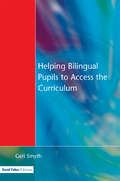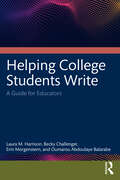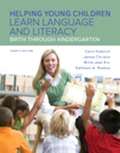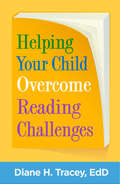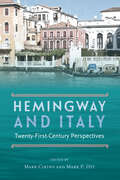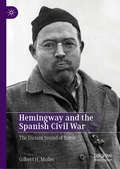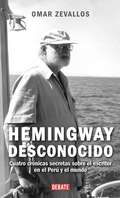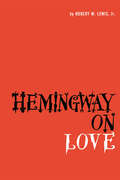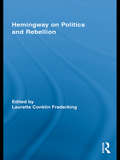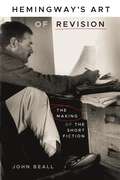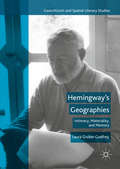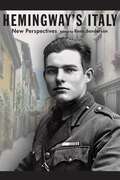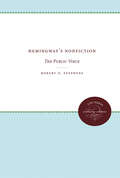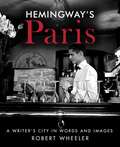- Table View
- List View
Hello, Círculos!
by San Antonio Museum of ArtWhat better way to learn shapes than with eye-catching works of art? With art from across Latin America and beyond, children will become armchair world travelers and art connoisseurs. This bilingual edition introduces early readers, and even earlier listeners, to shapes in both English and Spanish.
Hello, Círculos!
by San Antonio Museum of ArtWhat better way to learn shapes than with eye-catching works of art? With art from across Latin America and beyond, children will become armchair world travelers and art connoisseurs. This bilingual edition introduces early readers, and even earlier listeners, to shapes in both English and Spanish.
Hello, Writer.: An Academic Writing Guide
by David StarkeyHello, Writer: An Academic Writing Guide, developed for the first-year composition course with corequisite support, combines familiar academic writing and reading topics with a fresh and flexible approach that works in multiple teaching and learning contexts and with a range of college writers. Support for common first-year writing assignments—such as analyzing a text, arguing a position, and presenting research—sits side by side with support for first-year writers. Drawing heavily on principles of learning science and psychology and facilitating engagement through practice and reflection, this purposes-driven rhetoric offers a foundation for today’s high-challenge, high-support corequisite learning models. Reading strategies, noncognitive learning, and plenty of scaffolding pair easily with David Starkey’s easy-going conversational style. It’s an upbeat composition text that takes college success very seriously. Hello, Writer looks squarely at first-year students and says: You can do it. You belong here. You are a writer.What’s more, Achieve with Hello, Writer offers guided practice and facilitates writing, revision, reflection, and peer review—all in a powerful online platform designed to build skills, spark engagement, and boost confidence.
Help Your Kids with Language Arts: A Step-by-Step Visual Guide to Grammar, Punctuation, and Writing (DK Help Your Kids)
by DKIf English is sounding like a foreign language, make it easy and effortless with the ultimate study guide.This visual reference book takes you through all the different parts of the English language, leaving you ready to help your children tackle the trickiest of subjects. DK's unique study aid encourages parents and children to work together as a team to understand and use all aspects of the English language, including grammar, punctuation, and spelling. This latest title in the best-selling Help Your Kids series… combines pictures, diagrams, instructions, and examples to cover the components of the school syllabus, while building knowledge, boosting confidence, and aiding understanding. With your support, children can overcome the challenges of English, leaving them calm, confident, and exam ready. Series Overview: DK's bestselling Help Your Kids With series contains crystal-clear visual breakdowns of important subjects. Simple graphics and jargon-free text are key to making this series a user-friendly resource for frustrated parents who want to help their children get the most out of school.
Help for Billy: A Beyond Consequences Approach to Helping Children in the Classroom
by Heather T. Forbes"Help for Billy" is a pragmatic manual to help guide families and educators who are struggling with traumatized children. Based on the concept of the neuroscience of emotions and behavior, Heather Forbes provides detailed, comprehensive, and logical strategies for teachers and parents. This easy to read book, with tables, outlines and lists, clears the way for a better understanding of the true nature regarding traumatic experiences affecting the brain and learning. It is a must read for anyone working with a child in the classroom.
Help! For Writers: 210 Solutions to the Problems Every Writer Faces
by Roy Peter ClarkThe craft of writing offers countless potential problems: The story is too long; the story's too short; revising presents a huge hurdle; writer's block is rearing its ugly head. In HELP! FOR WRITERS, Roy Peter Clark presents an "owner's manual" for writers, outlining the seven steps of the writing process, and addressing the 21 most urgent problems that writers face. In his trademark engaging and entertaining style, Clark offers ten short solutions to each problem. Out of ideas? Read posters, billboards, and graffiti. Can't bear to edit yourself? Watch the deleted scenes feature of a DVD, and ask yourself why those scenes were left on the cutting-room floor. HELP! FOR WRITERS offers 210 strategies to guide writers to success.
Help! My Kid Hates Writing: How to Turn Struggling Students into Brave Writers
by Julie BogartA practical resource to help you turn struggle into success and become the writing coach your kid needs—from the creator of the award-winning Brave Writer curriculumWriting is often hard—for kids and for adults. How can we help our children get past the difficulties and learn the writing skills that are so necessary for communication, creativity, and critical thinking?In Help! My Kid Hates Writing, Julie Bogart shares the secrets to breakthroughs in writing that have made her award-winning Brave Writer program a smash hit among homeschoolers and beyond. From unlocking the joys of freewriting to overcoming fear of the red pen, it blends useful advice and hands-on exercises with in-depth explanations of the underlying philosophy—and throws in more than a few pep talks for parents along the way.Teach your kid not just what to write but how to write—and research, revise, and polish—with this encouraging and educational guide to language arts.
Helping Bilingual Pupils to Access the Curriculum
by Geri SmythThis book offers practical guidance for teachers working with bilingual pupils in mainstream primary and secondary education and aims to help teachers make the curriculum as accessible as possible to these children. It offers examples of the good practice that has evolved around teaching bilingual children in the classroom.
Helping College Students Write: A Guide for Educators
by Erin Morgenstern Laura M. Harrison Becky Challenger Oumarou Abdoulaye BalarabeAlthough many educators want to help their students overcome their writing challenges, most higher education instructors do not have formal training in teaching writing. This book provides a detailed roadmap for college educators to help students make substantial improvements in their writing, particularly in courses where writing is a component, but not the primary focus.This accessible guide offers conceptual tools and practical strategies, including lesson plans, stock comments instructors can use to explain frequently occurring writing problems, and writing prompts to help struggling students address writer’s block. Covering topics such as managing grading time, reducing students’ anxiety about writing, giving clear and formative feedback, troubleshooting, and providing practical tips for helping ESL students, this book is a one-stop shop for assisting students across academic disciplines.By implementing the guidance offered in this manual, college and university faculty and instructors can guide students effectively and efficiently in improving their writing.
Helping Mom (Fountas & Pinnell LLI Green #Level E, Lesson 72)
by Anna KeyesFountas and Pinnell Leveled Literacy Intervention Green System -- 1st Grade
Helping Young Children Learn Language And Literacy: Birth Through Kindergarten
by James Christie Carol Vukelich Kathleen Roskos Billie EnzHelping Young Children Learn Language and Literacy is about teaching the language arts in a reader-friendly, child-focused way. It provides pre-service and in-service teachers with sound instructional strategies to facilitate children's reading, writing, speaking, and listening development from birth through kindergarten. Each chapter identifies clear learning goals for readers and offers opportunities for self-assessment. <P><P>Recognizing that children are at the heart of good language and literacy teaching, the book focuses on four central themes: a perspective on teaching and learning that blends constructivism and science-based instruction, respect for diversity, instruction-based assessment, and family involvement in literacy learning. <P> The Fourth Edition includes coverage of the Common Core State Standards for English Language Arts, Grades K-12 and contains a number of new features that reflect recent developments in the field of language arts education and that will assist students in learning key concepts and strategies. The Enhanced Pearson eText features embedded videos and assessments.
Helping Your Child Overcome Reading Challenges
by Diane H. TraceyWhen your child struggles with learning to read, it can feel overwhelming. What causes reading difficulties? How can you support your child on the road to a rich and rewarding literacy life? Drawing on her dual expertise as a literacy specialist and a psychotherapist, Diane Tracey takes a unique and holistic approach to supporting children's health and emotional well-being along with their reading skills. In this straightforward, knowledgeable guide, she explains exactly how the reading process works and what you can do to foster literacy development every step of the way. Filled with checklists, fun activities to do with kids, and insightful stories, this compassionate resource gives you tools to help a struggling reader of any age become an avid book lover.
Hemingway and Italy: Twenty-First-Century Perspectives
by Mark Cirino Mark P. OttExploring the importance of Ernest Hemingway's time in Italy to his writing and legacyFrom his World War I service in Italy through his transformational return visits during the decades that followed, Ernest Hemingway’s Italian experiences were fundamental to his artistic development. Hemingway and Italy offers essays from top scholars, exciting new voices, and people who knew Hemingway during his Italian days, examining how his adopted homeland shaped his writing and his legacy. The collection addresses Hemingway’s many Italys—the terrain and people he encountered during his life and the country he transposed into his fiction. Contributors analyze Hemingway’s Italian works, including A Farewell to Arms, Across the River and into the Trees,lesser-known short stories, fables, and even a previously unpublished Hemingway sketch, “Torcello Piece.” The essays provide fresh insights on Hemingway’s Italian life, career, and imagination. Contributors: Giacomo Ivancich | Ruggero Caumo | Scott Donaldson | Sergio Perosa | Rosella Mamoli Zorzi | Davide Lorigliola | Alberto Lena | Miriam B. Mandel | Michael Kim Roos | John D. Schwetman | Adam Long | Marina Gradoli | Piero Ambrogio Pozzi | Kirk Curnutt | Cam Cobb | Kei Katsui
Hemingway and the Spanish Civil War: The Distant Sound of Battle
by Gilbert H. MullerDuring the 1930s, no event was more absorbing or galvanizing to Ernest Hemingway than the Spanish Civil War. Hemingway was passionately devoted to the cause of the democratically elected Spanish Republic and he spent much of the war reporting from its front lines, producing a deeply political body of work that illuminated the conflict and presaged the world war to come. In the end, his immersive journey into the turbulent world of the Spanish Civil War resulted in For Whom the Bell Tolls, a landmark in American political fiction. This book offers a fresh account of Hemingway’s adventures in Spain during the Civil War, stressing his embrace of radical political action and discourse in defense of the Republic against the forces of Fascism. On the eightieth anniversary of For Whom the Bell Tolls, Gilbert H. Muller reconsiders Hemingway as an engaged artist, political actor, and visionary.
Hemingway desconocido: Cuatro crónicas secretas sobre el escritor en el Perú y el mundo
by Omar Zevallos"La llegada de Hemingway al Perú fue anunciada días antes en la prensa capitalina con despachos de los enviados especiales que esperaban con ansias al Nobel de Literatura." La vida de Ernest Hemingway sigue siendo un territorio de imprevistas revelaciones para quien sepa adentrarse en sus misterios y leyendas. Este es el mérito de estas crónicas de Omar Zevallos, quien, valiéndose de la curiosidad y el rigor periodísticos, indaga en esos episodios de la vida del escritor estadounidense que han sido inadvertidos o poco trajinados por sus biógrafos: la visita que realizó Hemingway al Perú en los años 50; la supuesta aparición de su fantasma en Finca Vigía; la chica cubana con la que mantuvo un romance secreto; y su apasionada correspondencia con la diva de Hollywood, Marlene Dietrich. Cuatro historias, cuatro descubrimientos de una existencia marcada por los excesos, las tragedias, los amores y los libros.
Hemingway on Love
by Robert W. LewisLove was a central theme of Ernest Hemingway’s major works. And although his passages on sexual love and on romantic love may be widely remembered and frequently quoted, says Robert W. Lewis in this scholarly and detailed consideration, Hemingway’s later work revealed his ultimate belief that brotherly love was the supreme love of mankind. Eros, Hemingway concluded, was a neutral value, neither good nor bad in itself, but yet capable of complementing agape in giving man pleasure. By examining the forms and essences of the various kinds of love, Hemingway worked out an explanation and tentative solution to the troubles of the human condition. The tradition of romantic love that had prevailed in Western literature had challenged sexual love and brotherly love and had been confused with them since the Middle Ages. Hemingway’s early work was destructive of romantic love, says Lewis; the work of his middle career was crucial in his exploration for the supreme love and the means to whatever peace and happiness man may achieve. By the time he wrote The Old Man and the Sea, his ethic was formulated and he could write conclusively of the trial and lesson of love in Western civilization in a way that reflected his discovery that true love must be a reciprocal blend of eros and agape between man and woman, man and man, and man and his world.
Hemingway on Love
by Robert W. LewisLove was a central theme of Ernest Hemingway’s major works. And although his passages on sexual love and on romantic love may be widely remembered and frequently quoted, says Robert W. Lewis in this scholarly and detailed consideration, Hemingway’s later work revealed his ultimate belief that brotherly love was the supreme love of mankind. Eros, Hemingway concluded, was a neutral value, neither good nor bad in itself, but yet capable of complementing agape in giving man pleasure. By examining the forms and essences of the various kinds of love, Hemingway worked out an explanation and tentative solution to the troubles of the human condition. The tradition of romantic love that had prevailed in Western literature had challenged sexual love and brotherly love and had been confused with them since the Middle Ages. Hemingway’s early work was destructive of romantic love, says Lewis; the work of his middle career was crucial in his exploration for the supreme love and the means to whatever peace and happiness man may achieve. By the time he wrote The Old Man and the Sea, his ethic was formulated and he could write conclusively of the trial and lesson of love in Western civilization in a way that reflected his discovery that true love must be a reciprocal blend of eros and agape between man and woman, man and man, and man and his world.
Hemingway on Politics and Rebellion (Routledge Studies in Social and Political Thought)
by Lauretta Conklin FrederkingHemingway has been labeled a ‘communist sympathizer,’ ‘elitist’, and a ‘rugged individualist.’ This volume embraces the complexity of political advocacy in Hemingway’s novels and short stories. Hemingway’s characters physically, intellectually and spiritually become part of resisting current conditions and affirm the value of resistance, even destruction, regardless of political outcome. Much more than political nihilism, rebellion allows man to realize the potentialities of his greatness as a leader, the realities of his solidarity as a comrade, and the simple sensations of everyday living. Hemingway draws new perspectives on the meaning of politics in our own lives at the same time as his writings affirm boundaries of political thought and literary theory for explaining many of the themes we study.
Hemingway's Art of Revision: The Making of the Short Fiction
by John BeallIn Hemingway’s Art of Revision, John Beall analyzes more than a dozen pieces of the author’s celebrated short fiction, with a focus on manuscripts and typescripts, as part of a broader examination of how Ernest Hemingway crafted his distinctive prose through a rigorous process of revision. Ranging from two vignettes in the first version of In Our Time through early touchstones such as “Indian Camp” and “The Killers” to later masterpieces including “Fathers and Sons,” Beall’s study considers the modernist influences, aesthetic choices, and experimental effects that characterized Hemingway’s approach to the short story. Revisions to “Big Two-Hearted River,” for example, were not simply cuts and omissions, but involved adding paragraphs to slow down the narrative and represent Nick Adams’s careful observations of fish as he watched their shadows on the river. For “A Way You’ll Never Be,” Hemingway’s revisions developed Nick’s interior monologues, manic lecture about grasshoppers, and wacky sense of humor to show the character restoring a sense of emotional balance despite his traumatic memories of being wounded.By drawing attention to the meticulous omissions, additions, and replacements that shaped these texts, Beall reveals how extensively and richly Hemingway revised his drafts. Hemingway’s Art of Revision gives a detailed view of a great prose stylist at work.
Hemingway's Geographies
by Laura Gruber GodfreyThis book draws on the tools of literary analysis and culturalgeography to investigate Ernest Hemingway's sophisticated construction ofphysical environments. In doing so, Laura Gruber Godfrey revises conventional approachesto Hemingway's literary landscapes and provides insight about his fictionalcharacters and his readers alike.
Hemingway's Italy: New Perspectives
by Rena SandersonIn 1918, a one-month stint with the American Red Cross ambulance corps at the Italian front marked the beginning of Ernest Hemingway's fascination with Italy--a place second only to Upper Michigan in stimulating his lifelong passion for geography and local expertise. Hemingway's Italy offers a thorough reassessment of Italy's importance in the author's life and work during World War I and the 1920s, when he emerged as a promising young writer, and during his maturity in the late 1940s and early 1950s. This collection of eighteen essays presents a broad view of Hemingway's personal and literary response to Italy. The contributors, some of the most distinguished Hemingway scholars, incorporate new biographical and historical information as well as critical approaches ranging from formalist and structuralist theory to cultural and interdisciplinary explorations. Included are discussions of Italy's psychological functioning in Hemingway's life, the author's correspondence with his father during the writing of A Farewell to Arms, his stylistic experimentation and characterization in that novel, his juxtaposition of the themes of love and war, and his take on Fascism in both his fiction and journalistic work. In addition, the essayists explore relevant contexts of period and place--such as the rise of Fascism, ethnic attitudes, and the cultural currents between Italy and the United States. A landmark study, Hemingway's Italy brings long-overdue attention to this great writer's international role as cultural ambassador. Contributors: Rena Sanderson, Nancy R. Comley, Kim Moreland, Steven Florczyk, Kirk Curnutt, Lawrence H. Martin, John Robert Bittner, Joseph M. Flora, Jeffrey A. Schwarz, J. Gerald Kennedy, H. R. Stoneback, Beverly Taylor, Ellen Andrews Knodt, Linda Wagner-Martin, Robert Fleming, Miriam B. Mandel, Margaret O'Shaughnessey, Stephen L. Tanner, Vita Fortunati
Hemingway's Nonfiction: The Public Voice
by Robert O. StephensThis study explores Hemingway's newspaper and magazine journalism, his introductions and prefaces to books by others, his program notes on painting and sculpture exhibitions, and his statements in self-edited interviews. In doing so, it throws a new, oblique light on what has usually been regarded as his major work--his short stories and novels.Originally published in 1968.A UNC Press Enduring Edition -- UNC Press Enduring Editions use the latest in digital technology to make available again books from our distinguished backlist that were previously out of print. These editions are published unaltered from the original, and are presented in affordable paperback formats, bringing readers both historical and cultural value.
Hemingway's Paris: A Writer's City in Words and Images
by Robert WheelerWalk through the Streets of Paris with Ernest Hemingway. In gorgeous black and white images, Hemingway’s Paris depicts a story of remarkable passion--for a city, a woman, and a time. No other city in any of his travels was as significant, professionally or emotionally, as was Paris. And it remains there, all of the complexity, beauty, and intrigue that Hemingway described in the pages of so much of his work. It is all still there for the reader and traveler to experience--the history, the streets, and the city. Restaurants, hotels, homes, sites and favorite bars are all detailed here. The ninety-five black and white photographs in Hemingway’s Paris are of the highest caliber. The accompanying text reveals Wheeler’s deep understanding of the man; his torment, talent, obstacles and the places of refuge needed to nurture one of the preeminent writers of the twentieth century. Moved by the humanistic writing of the man--a writer capable of transcending his readers to foreign settings and into the hearts and minds of his protagonists--Wheeler was inspired to travel throughout France, Italy, Spain, Africa, and Cuba, where he has sought to gain insight into the motivation behind Hemingway’s books and short stories. As a teacher, lecturer, and photojournalist, he set out to capture and interpret the Paris that Ernest Hemingway experienced in the first part of the century. Through his journal and photographs, Wheeler portrays the intimate connection Hemingway had with the woman he never stopped loving, Hadley, and with the city he loved most, Paris.
Hemingway, Style, and the Art of Emotion
by David WyattIn Hemingway, Style, and the Art of Emotion, David Wyatt shows that the work of Ernest Hemingway is marked more by vulnerability and deep feeling than by the stoic composure and ironic remove for which it is widely known. This major reassessment of the shape of Hemingway's career recovers the soul of the author's work, revealing him as a multifaceted writer rather than a cold, static icon. Wyatt claims that Hemingway's famous early style does not embrace emotional reticence but works instead to measure the cost of keeping thoughts and feelings under the surface. By the early 1930s Hemingway also turned away from the art of 'the omitted' and began to develop a vision and style more accommodating of the awkwardness and embarrassments of everyday life. Relying on a thorough knowledge of the vast archive Hemingway left behind at his death, this book shows Hemingway as a thoroughly complex and transmutable figure.
